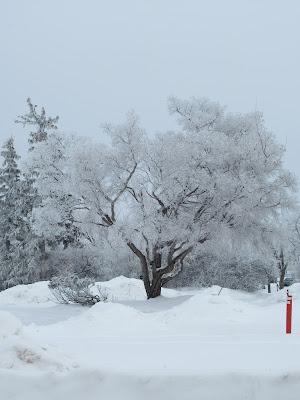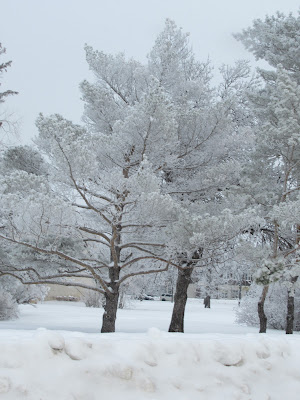A couple of weeks after Covid's onset, I'd get up in the morning, feeling enclosed in darkness, and my first thought would be "How am I going to get through today?" A day here and there is manageable. Indeed, James Parker, who writes the back page "Ode" for The Atlantic, says that mood swings are part of being normal in the twenty-first century as a pandemic seems to wind down while people are still dying and we're rescuing nature too slowly and a war in Ukraine hits its first anniversary and political factions have lost all sense of respect for anyone else's experience or opinion. But then the blackness came three days a week. Then for a whole week. These weren't mood swings anymore.
My indispensable therapist encourages my use of metaphors. So I told him that the days and weeks were like living deep in the back of a catacomb with only a torn map marking my route out and a flashlight that was flickering--a sign the batteries were dying. It's a decent metaphor because the darkness is pretty extreme, as is the sense of something weighing on you, closing in. Then one really bad afternoon, I had written in my calendar that I was to listen to Arvo Pärt's Berlin Mass. Because I was just marching through my days desultorily, I did what my calendar told me to do. The mass was written for the Catholic Days in Berlin in May of 1990, not long after the fall of the Berlin Wall. I could hear that the choir was singing in Latin, so I got out the liner notes and followed along. The opening Kyrie, asking for mercy, is haunting, full of dissonances made beautiful by the clear voices. Yes, well might I want some mercy right about now. Two alleluia verses, not a traditional part of the mass, spoke of renewal, followed by Veni sancta spiritus. Its cheerful triple meter asked for light, consolation, solace. After a Credo and Sanctus, the mass ended with a plangent plea to the Lamb of God for peace. All these longings, for mercy, light, consolation and peace reach back to the Middle Ages.
By the end, I was —the only word I’ve found was “lifted,” as if I’d come in touch with something transcendent. The cloud that let me see only half the world was gone. Puzzled, I tried to think where the transcendence came from. I’m not religious, certainly not Catholic, but I’ve been to enough Latin masses and have sung enough of them to recognize the words. Maybe being put in touch with those historical roots had given me perspective?
Or maybe it was an
aesthetic transcendence. Had Pärt channeled the masses that go back and back to Flemish Renaissance composer Johannes
Ockeghem, through Palestrina, Bach, Mozart, Beethoven, Stravinsky?
Music became the first panel in what I came to call my “transcendent cloak,” another helpful metaphor. There are elements of my life that, like a cloak, give me at least transitory comfort during days that are, mood-wise, cold and dark. Urged by my therapist to describe my cloak, I realized it was made of heavy silk, brocade, and velvet. It had two sides; I could wear the side with whites and creams and tans and greys when I needed gentle, serene comfort. When I needed energy, I would wear the side made of teal and navy and rose and purple. More importantly, though, I discovered that my cloak was made of my family, my rich friendships, these two cats who seem to believe that the most important task in their lives is to love and to be present. Nature is a crucial part of my cloak, whether it’s just the sparrows at the feeder or a day radiant with hoarfrost. Beauty of any kind can assuage my sense that I am completely out of tune with the world. Music was another strand. Stopping to be grateful can jar me into remembering what I have, not what I lack. These were the resources I had. They didn't "cure" the depression; indeed, we don't know enough about the brain to cure depression. But they were a counterbalance, a distraction, a visceral and profound reminder that the world didn't consists simply of darkness.
On one of my particularly dark days, I had lunch with Nikka in her apartment---always a respite, partly because we talk of anything except my mood. As I went down her stairs, which are outside (she lives in the second storey apartment of an old house), I slipped down the last five of her snowy steps, losing both my shoes and badly bruising the leg that was behind me when I slipped. "Shit!" I yelled at the universe, at the clouds, at whoever would listen. "I can't do this! I've had enough!" In my stocking feet, I stumbled through six inches of snow under her stairs where I found both my shoes. I got into the car to cry. You have to realize that falling (again) sets off my whole sense that my body is becoming incompetent, the worst symptom being vertigo that leads people, I am quite sure, to believe I am perpetually drunk. But my little camera was in the cup holder because my task for that afternoon was to take photographs of the startling hoarfrost. So I drove into Wascana Park and was stopped--pulled up--by beauty. What is this earth and her nature that gives us such beauty?
A few days later, "awe" turned out to be my word of the week. The Atlantic, which publishes an evening newsletter, included a link to a brief essay by Dacher Keltner called "The Quiet Profundity of Everyday Awe." Keltner begins "What gives you a sense of awe? That word, awe--the feeling of being in the presence of something vast that transcends your understanding of the world--is often associated with the extraordinary. You might imagine standing next to a 350-foot tree or on a wide-open plain with a storm approaching, or hearing an electric guitar fill the space of an arena, or holding the tiny finger of a newborn baby. Awe blows us away. It reminds us that there are forces bigger than ourselves, and it reveals that our current knowledge is not up to the task of making sense of what we have encountered." Later that day I got on the exercise bike and settled down to listen to Krista Tippett, whose "On Being" podcast has returned--for which I am so grateful. She was interviewing Keltner. Was "awe" the word for the week, or was Keltner on a book tour?
I bought the ebook, and it turns out there is a science of awe, a reason Pärt's music and the hoarfrost jolted me out of the darkness. Keltner and his colleagues asked 2,600 people, who used 20 languages and came from around the world, to write about experiences that led them to feel awe. Once these small essays were translated, he and his team of researchers could see that things that prompted awe fell into eight categories, which I'll write about in the coming weeks. Following up on this research, Keltner and his team discovered that the experience of awe had all kinds of positive effects on our bodies and moods.
But here is the main takeaway: Awe takes us out of ourselves. It opens us up to new experiences and feelings and questions. In one of his experiments, he had people go on "awe walks," where they would actively look for things that inspired awe. He also had a control group that was simply asked to take a walk. Both groups were encouraged to record their walks with photographs. Those in the control group invariably took classic selfies. In the "awe" group they stopped doing that quite soon and simply took photographs of the world around them. The longer they looked for awe, the more they found. We can deliberately make awe a practice in our days, days that for good reason are often difficult and dark, bringing a modicum of light to our moods. In the face of this difficult historical moment, there is actually something we can do for ourselves.



I'd like to feel awe a bit -- no, a lot -- more often than I do. At least when I do, it's noticeable! That's something. Spring is almost here, eventually the snow will be gone and green will be everywhere and that'll do. Winter has been beautiful too; especially those days when the hoarfrost sparkled in the sun. Hope you're feeling more awe yourself these days, Kathleen. -Kate
ReplyDeleteJust happened to check your blog today, and am glad (as always) that I did. I hope you've recovered from that nasty fall and the awe-negating blues. Remember you're still inspiring people worlds away. I'll have to check out that Atlantic article soon. Happy Spring, Kathleen!
ReplyDeleteOh, Sean. It's so good to hear from you! How are you doing? Students like you are indeed one of life's awesome gifts.
ReplyDeleteThank you, Kathleen. Doing fine, recently promoted to Professor. Book chapter coming soon (Team teachers in Japan: Beliefs, identities, and emotions.). Both daughters enjoying Uni in BC, and Megumi still teaches at primary school. After 30-plus years at it, she may retire a bit early once the girls graduate. We'll see. I hit 52 in May, and intend to keep teaching until my lungs give out, haha. Just finished re-listening to "The Brothers Karamozov" on the old iPod. What a book!
ReplyDeleteCan I give you my email address here (same as in '97) so we can write more? Let me read up on this and get back to you soon. Have a lovely June! -- Sean